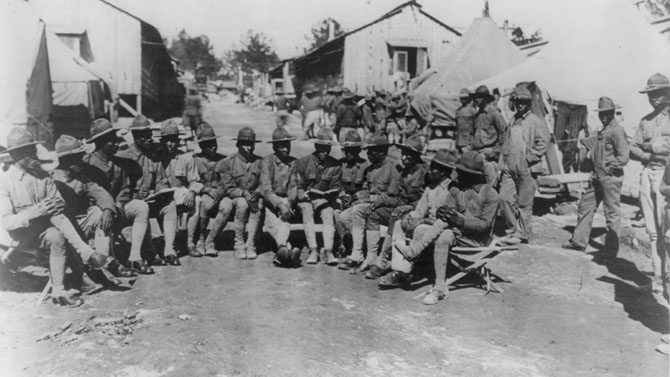Last week, to commemorate Black History Month, the team members of Reconstructing Black Athens ruminated on slavery, the Civil War and emancipation in 19th Century Athens. This week, we move forward in time to the dawn of the 20th Century, to the opening shots of World War I.
In 1897, Harry Hardeman was born in Athens. The son of Juliette Cornelius Hardeman, a single mother and Athens washwoman, Hardeman and his two sisters lived at 425 Pope St., just south of today’s Daily Groceries Co-op. By all accounts, he appeared to be a mischievous child; he, at least once, was caught “casting pebbles” at another boy. Whereas a white child most likely escaped the attention of law enforcement, a black child in Jim Crow Georgia did not. Twelve-year-old Hardeman—for his harmless, childish antics—found himself before the local police court. As punishment for the “crime,” reported The Weekly Banner, the Athens mayor “assessed the scrapper the sum of one dollar,” but rescinded the fine after “one of the older darkeys in the court volunteered to administer the necessary chastisement, in the place of the absent parent.” On the same day, in the same court, appeared five young white men accused of “introducing the game of ‘fly’ to the Classic City.” The mayor, however, “decided to let [off]” the “red-headed scrap of humanity” and his friends for playing their game of baseball on the Sabbath. The racial inequalities of justice were all too real for black Athenians.
In July 1914, war erupted in Europe. In April 1917, the United States entered that war. In July 1919, Athenians were drafted into that army. Responding to the need for manpower, America had implemented the Selective Service System—a national military draft in which local boards determined the fate of local people. In theory, conscription spread the burden of military service among the nation’s citizens, while in practice, these Southern draft boards tended to replicate racial and class-based inequalities. According to historian Jeanette Keith, “the racial biases embedded in draft board decisions and in federal policies not only worked to the detriment of black men but also increased the burden of conscription on poor whites.”
Hardeman—draft number 1,020—was selected for service. Before leaving town, he and 19 other young African-American men were honored with fanfare: a feast, a brass band and a parade through “the business section of town.” The next morning, on Oct. 3, the new members of the 157th Depot Brigade departed for the Camp Gordon training facility in DeKalb County. Hardeman never fought in Europe; his job was to supply and prepare other men for overseas duty. Other African-American units, such as Harlem’s Rattlers, fought with distinction. And, as UGA professor John H. Morrow and historian Jeffrey T. Sammons note, African-American soldiers stationed in France experienced far less discrimination from the French. From their fellow citizens, regardless of their position—as garrison troops or as front line soldiers—these uniformed, armed, African Americans challenged Jim Crow.
“For many African Americans, black servicemen stood as harbingers—torchbearers—of a new dawn of democratic freedom and opportunity reminiscent of Reconstruction,” notes historian Chad L. Williams. The inverse was equally true. “For many white Americans, black soldiers represented a distinctive threat to prevailing social hierarchies and white supremacist visions of American democracy.”
Once the war ended, Hardeman set aside his uniform and returned to Athens. In 1920, according to the U.S. Census, the 22-year-old worked as a garage laborer in town and lived with his mother on Church Street. For his wartime service, The Athens Daily Herald printed his name alongside the other “Clarke County Colored Men Who Served in the United States Army During [the] World War.” For some African Americans, the First World War was a time to reckon with the meaning of freedom, citizenship, democracy and self-determination. Having served either at home or abroad, veterans questioned the segregated world they returned home to. Was it fair to fight for freedom abroad while being denied that same freedom at home? Did Hardeman have these thoughts? Did he voice these opinions? We don’t know. In fact, we know very little about his life after the war. We know, from military records, that he was unemployed and unmarried in 1940, and that he died on April 10, 1971 from an unknown aliment. He is buried in Gospel Pilgrim Cemetery, a historic African-American Cemetery in East Athens.
Recently, members of UGA’s Department of History have begun researching the lives and deaths of Athenians buried in Gospel Pilgrim Cemetery. We invite community members to contribute photos, documents or memories of the approximately 3,500 individuals whose final resting place is here. Please contact Tracy Barnett: [email protected].
Like what you just read? Support Flagpole by making a donation today. Every dollar you give helps fund our ongoing mission to provide Athens with quality, independent journalism.








